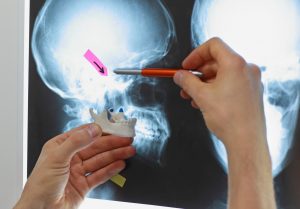Signs that Could Indicate Your TMJs Are Damaged
 For many people who have untreated TMJ disorder, the problem isn’t that their condition is difficult to treat. On the contrary, many people fail to address the disorder because they don’t realize they have it. Unlike many other oral health concerns, TMJ disorder can have an incredibly wide variety of symptoms and consequences for your oral health, depending on a large number of personal factors. Fortunately, however, there are some signs that can be more consistent than others among people who suffer from a TMJ disorder. Today, we take a closer look at TMJ disorder and some of the common symptoms that could develop because of it.
For many people who have untreated TMJ disorder, the problem isn’t that their condition is difficult to treat. On the contrary, many people fail to address the disorder because they don’t realize they have it. Unlike many other oral health concerns, TMJ disorder can have an incredibly wide variety of symptoms and consequences for your oral health, depending on a large number of personal factors. Fortunately, however, there are some signs that can be more consistent than others among people who suffer from a TMJ disorder. Today, we take a closer look at TMJ disorder and some of the common symptoms that could develop because of it.
What are temporomandibular joints?
TMJ stands for temporomandibular joint, which is the name of the joint on either side of your jaw that allows for your mandible’s (lower jaw’s) range of movement. Each of your two TMJs should move and function together, in the same direction, at the same time, and to the same degree. This proper and balanced function relies on several different factors, including the alignment of your teeth, the symmetry of your jawbone, and much more. If any one of these factors is off, then the consequences could include damage to one or both TMJs, and a range of symptoms specific to the unique problem with your jaw joints.
What TMJ damage and dysfunction mean
One of the main reasons why TMJ disorder can cause a wide range of differing symptoms between patients is because the disorder itself can be different. For example, you may experience damage to the joint tissue in one of your TMJs, or a misalignment that causes of them to move differently than its counterpart. It might also include inflammation, arthritis, and more, but in each case, the development of the disorder means that your jaw can no longer function as comfortably and efficiently as it’s meant to. This dysfunction is the key to the varying symptoms and consequences the disorder can manifest.
What kind of symptoms can you experience?
While many symptoms of TMJ are highly specific and unique to your condition, there are several impacts that result from your bite’s inability to function properly, and can result from several different types of TMJ disorders. For example, because the condition affects the joints that control your jaw’s movement, you may experience:
- Popping and clicking when you bite and chew
- Pain and soreness in your jaw and facial muscles
- Your jawbone shifting to the side when you open and close it
- Increasingly more frequent headaches and/or migraines
- An increasingly more frequent tendency to grind your teeth
- And much more
Learn if your TMJs are damaged or dysfunctional
If your TMJs become damaged or cease to function properly for some reason, the symptoms of the disorder could include a wide variety of aches and pains. To learn more about treating it early, schedule a consultation by calling Modern Smile in North Hollywood, CA, today at 818-763-9353. We also proudly serve patients who live in Burbank, Toluca Lake, and all surrounding communities.


